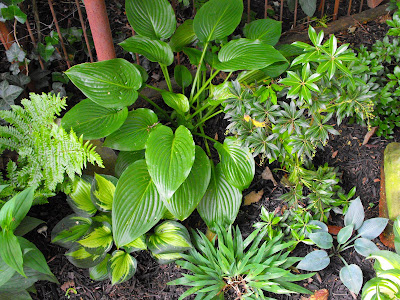 Contemporary garden fashions tend toward the ecologically friendly: xeriscaping, water conservation, increased use of native plants, and wildlife-friendly gardens. In the food world, the analogue is the potager, the French term for kitchen gardens (i.e., growing one's own food) and the local (and organic) food movement made popular by Alice Waters.
Contemporary garden fashions tend toward the ecologically friendly: xeriscaping, water conservation, increased use of native plants, and wildlife-friendly gardens. In the food world, the analogue is the potager, the French term for kitchen gardens (i.e., growing one's own food) and the local (and organic) food movement made popular by Alice Waters.[Side note: There is a fabulous restaurant in Denver called Potager. In keeping with the principle of local, organic food, the menu changes each month; the results are spectacular! To add to one's dining experience, patrons can dine in the potager itself--my favorite part!]
 In any case, wildlife gardens have also come in vogue. Planting for butterflies and insects, birds and small animals (after all, who wants deer or elk in the garden? They'd decimate it.) is supposed to enhance the experience. I agree. Up to a point.
In any case, wildlife gardens have also come in vogue. Planting for butterflies and insects, birds and small animals (after all, who wants deer or elk in the garden? They'd decimate it.) is supposed to enhance the experience. I agree. Up to a point.First, though we live not near any standing body of water, the rear garden is always swarming with mosquitoes. The resident bat moved away (apparently I took too many pictures of it, which of course I cannot find to add to this post). So, to attract birds, which no doubt feast on those blood-sucking fiends, I planted bushes with delicious berries (Nandina, Mahonia) and Liriope with its spikes of purple fruit. But those ungrateful aviators simply take the fruit and fly away, leaving me to serve as the feast for my mosquitoes. That leaves me with two methods: dropping mosquito pellets in my water barrel to keep the swarm slightly at bay, and dousing myself with mosquito repellant. The 23 bites I suffered while watering last night testify to the fact that I need more repellant spray.
Second, an opossum family took up residence next door, and part of my garden acts as a transit cooridor. Look at the broken Ostrich Fern fronds. Look at the flattened Sum and Substance Hosta, which normally stands very tall and proud. Look at the Pieris japonnica, its branches either broken or so bent that they run parallel to the ground.

Third, those damn squirrels dig holes, always next to a plant, always dislodging roots.
And then there is the Gramsci-cat, the rarest of the wildlife species, whose penchant for watering and fertilizing has destroyed many a plant.
Sometimes wish I had a BB gun (but not to use on Gramsci, of course).
Wildlife gardens be damned!



At my schools in FL, we always planted butterfly gardens. Those are awesome :). Is there anything else that eats/repels mosquitoes? Frogs?
ReplyDeleteButterfly gardens, yes: what a great way to introduce children to gardening. And thanks for the suggestion, Jenny! Frogs would be a perfect addition to the garden. Gardeners with space should think about installing some kind of water feature--a small pond, for instance--to attract and house the frogs. (Yet make sure the water circulates, lest you provide a breeding ground for more mosquitoes.)
ReplyDelete